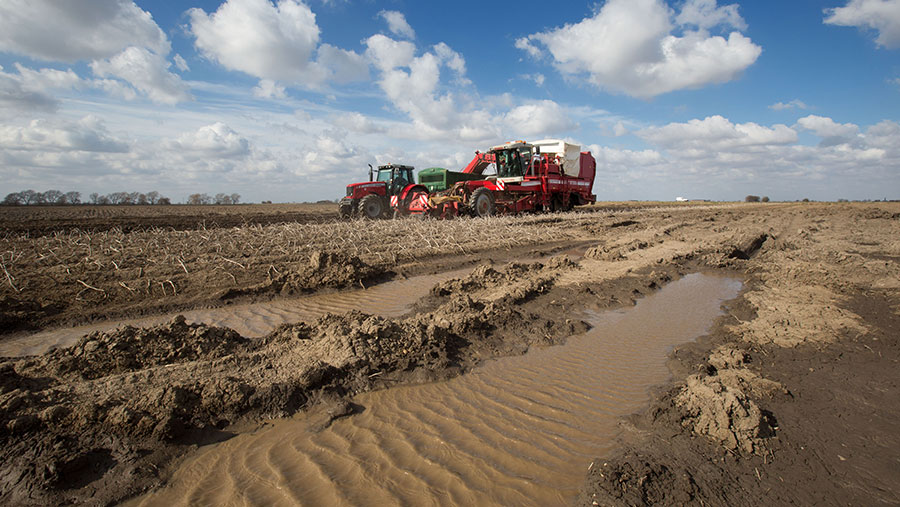Opinion: An autumn to make even the hardiest farmers grimace
 © Tim Scrivener
© Tim Scrivener As a potato grower, I live in fear of a lot of rain in the last month or two of the year. This is what we refer to in the local vernacular as “a wet back end”.
I try to avoid using that particular phrase when I’m speaking to non-farmers, though – I find it makes them grimace.
But 2019 will be remembered as the year that most farmers in the UK were plagued by a chronically wet back end – and there aren’t many of us who aren’t currently grimacing as a result.
See also: Wet autumn prompts plea for flexibility on compliance rules
Normally, I am not one for moaning about the climate. Talking about the weather is the conversational refuge of people with nothing else to say.
I rarely even watch the forecasts – still less would I ever keep records on rainfall or temperature. I find most local farmers will provide this service for me for free anyway and are quick to offer the statistics in conversation without even needing to be asked.
Having said all of that, here is a column about the weather. In 30 years, I can’t remember a more difficult farming year than this one. The endless rain here has followed a year of practical drought. It is almost as though the weather, like an attention-seeking child, had to keep raising its game until, finally, I was forced to talk about it.
In years to come, I will remember 2019 as a year so wet that we needed two sets of brushes on our road sweeper, having spent so much time trying to keep the roads clean of mud from tractor tyres. Every job has been hard work since May and the whole team here has worked their socks off and feels utterly exhausted.
Repeat of 1976 harvest
There are a few photos in existence of the terrible soil conditions farmers experienced in the wet potato harvest of 1976 – two-wheel-drive tractors buried up to their axles with tail slave forklifts and half-tonne boxes on the back – this year will be remembered with the same horror.
The big difference is that now we have bigger tractors, wider tyres, better headlights and the threat of the law courts if we fail to meet supermarket contracts – our capacity to burn money, exhaust ourselves and cause long-term damage to our precious soils is much greater now.
The consolidation of our customer base means we are also unlikely to see the consolation of the price hikes that followed in 1976.
In difficult times like these, there are two leadership approaches you can take. You can put your waders on, grab a spade with one hand and a tow strap in the other and start yelling at everyone like Genghis Khan leading his troops.
The alternative is to sit patiently on a beanbag like the Dalai Lama, taking deep breaths and reading motivational Buddhist memes on Facebook until the sun starts shining again.
My personal reflection, from my beanbag, is that we learn a lot in years like these. You discover your strengths, as well as your weaknesses.
Farmers who have invested wisely in their soil structure, land drainage and machinery maintenance tend to get their rewards in such adversity. Ultimately, as with all painful experiences, we emerge bruised, but stronger.
